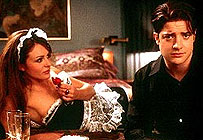|
|
|
|
Bedazzled
|
 |
|
Critics sometimes get carried away when they hail – or lament – the ascension of pure spectacle over old-fashioned storytelling values in today's mainstream entertainment. The truth is that even the most frivolous piece of Hollywood eye-candy still tries to keep a firm grasp on a conventionally well-formed plot. It may not always succeed in doing so, however. Harold Ramis' Bedazzled is a remake of Stanley Donen's 1967 British original – hailing from that brief but glorious Pop Art moment in popular film which also had people howling about the triumph of style over substance. This version has a lot going for it, beginning with a tremendous cast. Brendan Fraser is a gifted comic, willing and able to contort himself in any way, shape or form for a gag. His portrayal of Elliot is a masterpiece of nerdish humiliation. And Elizabeth Hurley is a camp treat as the Devil who persuades Elliot to sign away his soul. But the film is very wonkily structured. At its centre – indeed, probably the chief reason for making it – is the gauntlet of the seven wishes granted to Elliot. Each wish materialises itself in an imaginary, alternative life in which Elliot is rich or sensitive or handsome or ... But the Devil (in a slightly obscure bit of plot logic) either ruins the fantasy for Elliot every time, or perhaps simply lets him learn the vicissitudes of the wishing process for himself. The wish-fulfilment sequences are, in themselves, absolutely hilarious. The pastiches of various pop culture forms – including sports broadcasts and exotic fantasy-adventures – come thick and fast. It is like a magnificent show-stopping routine – fun to watch but damaging to the forward momentum of the movie as a whole. Obviously grappling with this imbalance between pure, zany spectacle and a solid, Hollywood-style plot, Ramis shaves the seven wishes down to five. Groundhog Day (1993), the highlight of Ramis' directorial career, also used an alternative-worlds premise and a potentially cumbersome structure of repetition. But that film was charming and ingenious in the way it gradually altered the mood and content of its material so as to create a satisfying arc for its hero. Bedazzled never finds a similar structure. After its introductory section, it plunges into the wishes. Much later, it takes a brief and desultory shot at turning into a horror movie, once the Devil becomes displeased. And very soon after that, give or take a few mechanical plot twists and resolutions, the film is over. In essence, Bedazzled shows the difficulties in changing over, mid-film, from an outrageously cartoonish plot to a romantic comedy. It's not an impossible transition but, for starters, characters have a different weight or reality depending on which kind of genre they are supporting. Ramis has a particularly hard time making Elliot's heartthrob, Alison (Frances O'Connor), into a coherent, likeable person, and rendering poignant the prospect of her ever getting together with Elliot. If this signals a new kind of moviemaking, it can only be a species of product aimed squarely at the burgeoning DVD market – with its technology that allows consumers to easily enjoy their own personal, anthology selections of favourite film scenes. Bedazzled doesn't hang together as an entire movie, but it does have some priceless moments of comic excess. MORE Ramis: Analyze This, Analyze That, Multiplicity © Adrian Martin January 2001 |
![]()